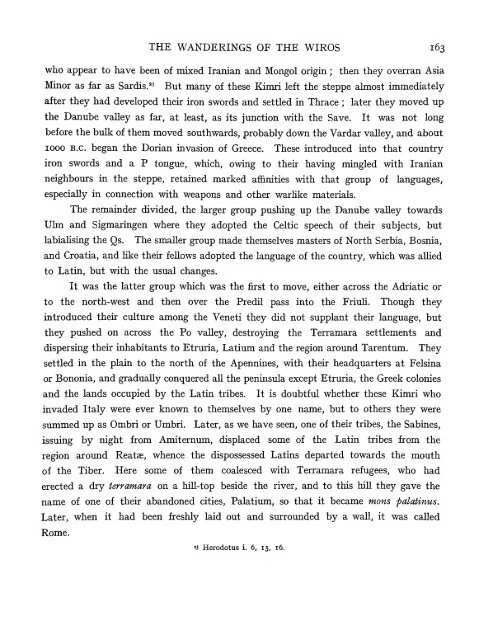The bronze age and the Celtic world - Universal History Library
The bronze age and the Celtic world - Universal History Library
The bronze age and the Celtic world - Universal History Library
Create successful ePaper yourself
Turn your PDF publications into a flip-book with our unique Google optimized e-Paper software.
THE WANDERINGS OF THE WIROS 163<br />
who appear to have been of mixed Iranian <strong>and</strong> Mongol origin ;<br />
<strong>the</strong>n <strong>the</strong>y overran Asia<br />
Minor as far as Sardis/^ But many of <strong>the</strong>se Kimri left <strong>the</strong> steppe almost immediately<br />
after <strong>the</strong>y had developed <strong>the</strong>ir iron swords <strong>and</strong> settled in Thrace ;<br />
later <strong>the</strong>y moved up<br />
<strong>the</strong> Danube valley as far, at least, as its junction with <strong>the</strong> Save. It was not long<br />
before <strong>the</strong> bulk of <strong>the</strong>m moved southwards, probably down <strong>the</strong> Vardar valley, <strong>and</strong> about<br />
1000 B.C. began <strong>the</strong> Dorian invasion of Greece. <strong>The</strong>se introduced into that country<br />
iron swords <strong>and</strong> a P tongue, which, owing to <strong>the</strong>ir having mingled with Iranian<br />
neighbours in <strong>the</strong> steppe, retained marked affinities with that group of langu<strong>age</strong>s,<br />
especially in connection with weapons <strong>and</strong> o<strong>the</strong>r warhke materials.<br />
<strong>The</strong> remainder divided, <strong>the</strong> larger group pushing up <strong>the</strong> Danube vaUey towards<br />
Ulm <strong>and</strong> Sigmaringen where <strong>the</strong>y adopted <strong>the</strong> <strong>Celtic</strong> speech of <strong>the</strong>ir subjects, but<br />
labiaUsing <strong>the</strong> Qs. <strong>The</strong> smaller group made <strong>the</strong>mselves masters of North Serbia, Bosnia,<br />
<strong>and</strong> Croatia, <strong>and</strong> like <strong>the</strong>ir fellows adopted <strong>the</strong> langu<strong>age</strong> of <strong>the</strong> country, which was allied<br />
to Latin, but with <strong>the</strong> usual changes.<br />
It was <strong>the</strong> latter group which was <strong>the</strong> first to move, ei<strong>the</strong>r across <strong>the</strong> Adriatic or<br />
to <strong>the</strong> north-west <strong>and</strong> <strong>the</strong>n over <strong>the</strong> Predil pass into <strong>the</strong> FriuU. Though <strong>the</strong>y<br />
introduced <strong>the</strong>ir culture among <strong>the</strong> Veneti <strong>the</strong>y did not supplant <strong>the</strong>ir langu<strong>age</strong>, but<br />
<strong>the</strong>y pushed on across <strong>the</strong> Po vaUey, destrojdng <strong>the</strong> Terramara settlements <strong>and</strong><br />
dispersing <strong>the</strong>ir inhabitants to Etruria, Latium <strong>and</strong> <strong>the</strong> region around Tarentum. <strong>The</strong>y<br />
settled in <strong>the</strong> plain to <strong>the</strong> north of <strong>the</strong> Apennines, with <strong>the</strong>ir headquarters at Felsina<br />
or Bononia, <strong>and</strong> gradually conquered aU <strong>the</strong> peninsula except Etruria, <strong>the</strong> Greek colonies<br />
<strong>and</strong> <strong>the</strong> l<strong>and</strong>s occupied by <strong>the</strong> Latin tribes. It is doubtful whe<strong>the</strong>r <strong>the</strong>se Kimri who<br />
invaded Italy were ever known to <strong>the</strong>mselves by one name, but to o<strong>the</strong>rs <strong>the</strong>y were<br />
summed up as Ombri or Umbri. Later, as we have seen, one of <strong>the</strong>ir tribes, <strong>the</strong> Sabines,<br />
issuing by night from Amiternum, displaced some of <strong>the</strong> Latin tribes from <strong>the</strong><br />
region around Reatse, whence <strong>the</strong> dispossessed Latins departed towards <strong>the</strong> mouth<br />
of <strong>the</strong> Tiber. Here some of <strong>the</strong>m coalesced with Terramara refugees, who had<br />
erected a dry terramara on a hiH-top beside <strong>the</strong> river, <strong>and</strong> to this hiU <strong>the</strong>y gave <strong>the</strong><br />
name of one of <strong>the</strong>ir ab<strong>and</strong>oned cities, Palatium, so that it became mons palatinus.<br />
Later, when it had been freshly laid out <strong>and</strong> surrounded by a wall, it was called<br />
Rome.<br />
»3 Herodotus i. 6, 15, 16.







